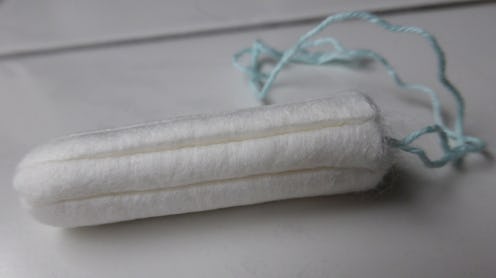Life
7 Times You Should Never Wear A Tampon

Tampons can be super essential during your period, but we have all heard those horror stories about tampon usage gone wrong. No one wants toxic shock syndrome (TSS), so it's important to know the times you should never wear a tampon. They are extremely useful, but tampons can also be dangerous if used incorrectly, and it's good to practice discretion during times where you're not quite sure if a tampon is necessary.
"Let’s face it: Tampons are a foreign object that stay inside the vagina for an extended period of time," says Sherry Ross, MD, OB/GYN over email. "Even though the tampon is a 'sterile' foreign object, you still have to be mindful about how long you leave it inside this delicate and sensitive area of the body. Anything put inside the vagina has an expiration date, even tampons."
Not following proper tampon hygiene can lead to an increased risk of infection or TSS, a complication of a Staph bacterial infection that although is rare, can occur fast and be extremely serious, even leading to death. Regularly changing your tampon and paying attention to your tampon usage can help prevent TSS and keep your vagina as healthy as possible.
Here are seven times you should never use a tampon.
1If You're Sleeping For Awhile
If you know you can sleep a straight 8 to 10 hours without getting up to pee, you may want to use a sanitary pad or menstrual cup at bedtime. "Since the maximum amount of time to leave a tampon inside the vagina is 8 hours, you will need an alternative," says Ross. "The vagina-safe menstrual cup can be worn for 12 hours and won’t make a mess of your sheets during your slumber."
2If You're Not On Your Period & Are Just Having Discharge
If you are not bleeding but are experiencing an increase in vaginal discharge, don’t wear a tampon. "Some women wear a sanitary pad or slender tampon when they notice an increase in vaginal discharge," says Ross. "It is never a good idea to use a tampon to absorb the wetness from the discharge. It’s best to see your health care provider to make sure you don’t have a vaginal infection."
3If You're Pregnant
Do not use a tampon in pregnancy. "If bleeding does occur in pregnancy, it is essential that the woman gets evaluated for that because there can be different time sensitive causes that could affect the pregnancy," says Dr. Christine Greves over email.
4If You Just Had A Baby
After having a baby, some women want to catch the post-delivery drippings and blood with a tampon instead of a sanitary pad. "During the first 6 weeks after having given birth, you do not want anything inside the vagina, since you are at an increased risk of an infection inside the uterus," says Ross. "After seeing your health care provider during the standard 6 week postpartum visit, you will be given permission to use a tampon if interested."
5If Recently Had Surgery
"It is not best to wear a tampon after a surgical procedure involving the vagina, vulva, or cervix," says Greves. "It is important to let the area heal without a foreign object that could result in infection and affect wound healing."
6If You're Using A Vaginal Medication
When using vaginal medications, like antifungals for a vaginal yeast infection, it is important not to use tampons after that," says Greves. "It could affect the amount of medication absorbed."
7If You Have A History Of Toxic Shock Syndrome
If you have a history of toxic shock syndrome, avoid using tampons. "History can repeat itself, so it is strongly advised not to wear tampons again if having experienced this event," says Greves.